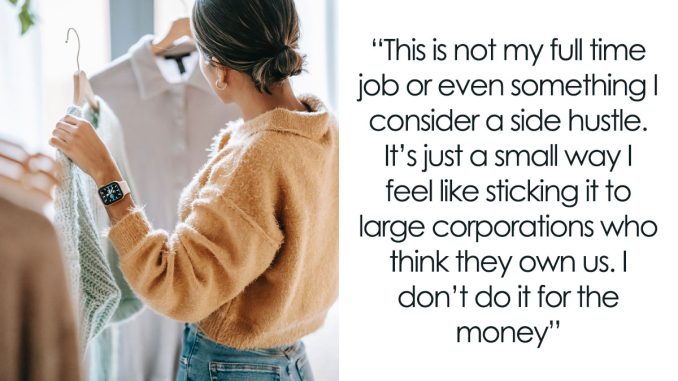
In the ‘40s of the last century, wanting to radically improve the level of service, businesses came up with the concept of mystery shopping (or secret shopping, as it is also often called). The concept is simple, like everything ingenious – a random person is paid a small amount of money to use the services of an establishment, and then evaluate the level of their service.
In an ideal world where peace and friendship reign, and pink ponies carefreely chase rainbow butterflies, the results of such marketing research should not be used by company higher-ups to punish or fire employees. But you and I live in the real world… However, there are secret heroes here too – like, for example, the user u/JurassicPark-fan-190, whose story we’re about to tell you today.
More info: Reddit
The author of the post does a part-time job as a mystery shopper and she has one unique feature
Image credits: Liza Summer (not the actual photo)
The woman always leaves only positive reviews after her visits, in order to help and support the employees
Image credits: JurassicPark-fan-190
She does so as she knows that business higher-ups and owners often use secret shoppers’ reviews as a cause to punish staff
Image credits: Phillip Stewart (not the actual photo)
Image credits: JurassicPark-fan-190
However, if the author faces any crucial safety issues, she always reports them in her reviews
Image credits: Manfred Sommer (not the actual photo)
Image credits: JurassicPark-fan-190
The author believes this is her contribution in confrontation with the injustice from the big business world
So meet the Original Poster (OP), a woman for whom being a secret shopper is not so much a job as an opportunity to go to a cafe or restaurant for free, and also bring people a little joy. How? In fact, it’s very simple. It turns out that whenever the author of a post does her job, she always writes a positive review – even if the service level has been poor.
Why is she doing so? Actually, for two reasons. Firstly, because, as we already wrote above, business management, instead of using the results of secret shoppers’ work to improve service, simply applies punitive measures to its own employees – up to and including dismissal.
Secondly, as the OP herself admits, “it’s just a small way I feel like sticking it to large corporations who think they own us.” In general, this is a kind of petty confrontation against the ruthless corporate world. So, it is not at all surprising that the original post was published in the Reddit Antiwork community…
But the author does not neglect this moonlighting at all – she sincerely admits that if she encounters some serious safety issues while working, then, of course, she reports them. But the OP sees her main mission here as helping people. After all, even if an employee doesn’t look happy in their workplace, it’s not their fault at all, is it?
Image credits: Tim Vrtiska (not the actual photo)
In fact, of course, mystery shopping is a huge industry today, with the Mystery Shopping Providers Association (MSPA), uniting experts in this field around the world. According to an unwritten tradition, the work of a mystery shopper should not be the main one for the person performing this function – simply so that the reviews are as objective as possible.
However, there is plenty of abuse and simple fraud here too. We have already written that customers of these services often use the study results to punish employees, but there are often scammers who defraud people of money under the pretext, for example, of training them to be secret shoppers and whatnot.
In this case, for example, the Federal Trade Commission strongly recommends the following points:
– don’t pay to work
– don’t pay for a list of mystery shopping jobs
– never wire money as part of a mystery shopping assignment
– never deposit checks into your bank account and send money back
– don’t apply for mystery shopping jobs that guarantee you’ll make a lot of money
– don’t respond to a job notice saying it’s with MSPA.
As we can see, probable secret shoppers should adhere to these recommendations, and always remember that mystery shopping is not a dream job where you eat for free and also get paid, but rather a pleasant social opportunity. As, for example, is the case with the original poster. Can her reviews be considered poor quality work? Let’s just listen to the commenters on the original post.
And here all the people are quite sure that businesses are still using the research results for no good, so, according to many commenters, the OP is most likely doing a good job. “Not all heroes wear caps. You are awesome!” one of the folks wrote with admiration. And the discussion of the post also initiated an extensive debate about the effectiveness of mystery shopping per se. By the way, you can join such a debate in the comments below this post as well!
The author’s post sparked massive debate over mystery shopping’s effectivity per se, but many people simply praised her for doing a good job
The post This Tell-Tale Story Told By A Mystery Shopper Not Willing To Frame Workers Goes Viral first appeared on Bored Panda.
